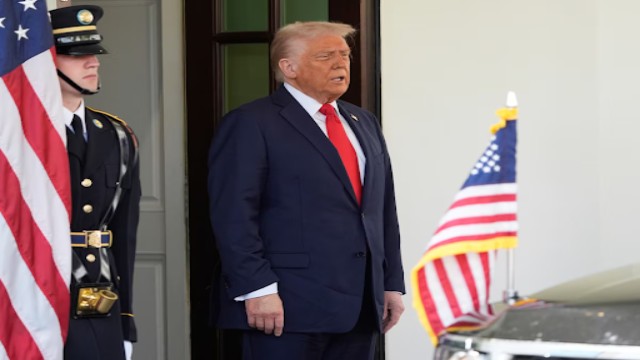
U.S. President Donald Trump welcomes El Salvador's President Nayib Bukele to the White House on April 14 in Washington. The Canadian Press
U.S. President Donald Trump is considering reducing tariffs for auto manufacturers while also starting the process to impose new tariffs on semiconductors and pharmaceuticals. This move comes as trade uncertainty continues to grow, affecting businesses and international relations.
During a speech at the White House on Monday, President Trump discussed giving automakers more time to adjust their supply chains. He suggested that car companies sourcing parts from Canada and Mexico might need extra time to increase production in the U.S. “I’m looking at something to help some of the car companies,” he said, although he did not go into further details.
Trump’s remarks come after the administration recently exempted smartphones, tablets, and other tech products from steep tariffs on Chinese imports. Instead of those tariffs, Trump and Commerce Secretary Howard Lutnick have suggested that a new tariff on semiconductors would be imposed.
When asked about potential exemptions for smartphones, Trump was open to changes. “There will be maybe things coming up,” he said, mentioning that he had discussions with Tim Cook, the CEO of Apple. Trump also expressed his flexibility, saying, “I don’t want to hurt anybody,” although he emphasized his tough stance on trade.
Under Trump’s direction, the U.S. Department of Commerce is now investigating potential tariffs on semiconductors and pharmaceuticals. The investigation, initiated under Section 232 of the Trade Expansion Act, allows the U.S. to impose tariffs for national security reasons. This process is familiar, as Trump used the same law to implement 25% tariffs on auto imports, steel, and aluminum.
The investigation into semiconductors and pharmaceuticals will include a public comment period lasting three weeks, starting Wednesday. Trump hopes that tariffs on pharmaceuticals will encourage drug manufacturers to bring production back to the U.S., ensuring the country's economic and national security. “The higher the tariff, the faster they come,” he said, referring to drug manufacturers moving their operations to the U.S.
Since taking office, Trump has made tariffs a central part of his economic strategy. However, his approach has been unpredictable. At times, he has exempted certain products from tariffs, only to raise tariffs later. In April, Trump announced tariffs on nearly every country but quickly altered the plan, replacing individual tariffs with a 10% universal tariff. The most significant changes have targeted China, with tariffs raised to 125%.
Earlier this year, Trump also imposed tariffs on Canada and Mexico, particularly for oil, gas, and other goods, though certain products under the U.S.-Mexico-Canada Agreement were exempt. However, Canadian and Mexican autos remain subject to the 25% tariff.
Industry representatives have had mixed reactions to Trump’s shifting policies. David Adams, head of Global Automakers of Canada, pointed out that the 25% tariffs violate the U.S.-Mexico-Canada Agreement (USMCA). Flavio Volpe, representing Canadian auto-parts makers, noted that Trump’s comments suggest a growing recognition of the importance of Canadian, Mexican, and possibly Chinese manufacturing to the U.S. auto industry.
Auto manufacturers have already felt the impact of tariffs. In Ontario, two car plants temporarily closed, and thousands of workers faced layoffs. Companies like Linamar, an auto-parts maker, have said moving factories to the U.S. to avoid tariffs would be expensive.
Meanwhile, a potential pharmaceutical tariff could have severe consequences for Canadian drugmakers, particularly those exporting generic drugs to the U.S. American consumers, already facing high drug prices, would also be affected by higher medication costs.
Experts have raised concerns that the investigation into semiconductors and pharmaceuticals could face legal challenges, especially since Trump’s administration may bypass the investigation's full process.















